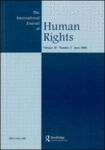

Publications | Indigenous rights in southern Africa : international mechanisms and local contexts
Indigenous rights in southern Africa : international mechanisms and local contexts | - 14 juin 2011

Jennifer Hays and Megan Biesele have recently edited a special issue of International Journal of Human rights entitled "Indigenous Rights in Southern Africa : Global Mechanisms and Local Contexts" (Volume 15, Number 1, 2011).
Introduction :
"The San are the indigenous peoples of southern Africa, numbering approximately 100,0001 and representing three linguistic families.2 Once living throughout the southern part of the continent, today the San live primarily in Botswana and Namibia, to a lesser extent in Angola and South Africa, with very small numbers also residing in Zambia and Zimbabwe. Like indigenous peoples worldwide, San communities are currently facing drastic social change, extreme marginalisation and poverty.3 Hitchcock and Garcia-Alex emphasise the starkness of indigenous peoples’ deprivation, noting that ’they tend to have the lowest health and nutritional standards, the highest rates of unemployment, illiteracy, and mortality, the shortest life spans, the lowest incomes, and the lowest degrees of political participation of the various categories of people in the countries in which they reside’.4 This description fits for the San of southern Africa, who have played an important role in the collective global imagination about human ancestry, and have been a prime focus of much anthropological research. Despite all this attention, the standards of living have continued to deteriorate. Can a rights-based approach help ? Will the signing of the UN Declaration on the Rights of Indigenous Peoples have any impact ? How do local, national and regional contexts come into play ? What do anthropologists have to contribute to a discussion of indigenous rights in southern Africa ?
The papers included in this volume were presented at the American Anthropological Association conference held in San Francisco in 2008, in a panel entitled : Southern Africa and the UN Declaration on the Rights of Indigenous Peoples : How Can International Mechanisms Work in Local Communities and Contexts ? This conference was held the year after the signing of the UN Declaration on the Rights of Indigenous Peoples (September 2007), and there was much interest at the conference in this historic event. The UN Declaration on the Rights of Indigenous Peoples (referred to in this volume also as UNDRIP, or in some places simply The Declaration) is one of the most deliberated and consultative documents in the history of the UN ; it is also the only declaration which the rights-holders themselves - represented by leaders of indigenous organisations - helped to draft. The Declaration is thorough, comprehensive, and addresses the concerns of indigenous peoples and governments. Despite the time and care taken in constructing it, implementation of the UNDRIP poses many challenges stemming from political, economic, legal, social and cultural differences and barriers ; the shape that these challenges take varies greatly from place to place.
To be effective, any implementation of indigenous rights must thus be based upon deep understanding of the particular situation and the issues at stake, including the specific challenges and supporting factors in a particular region, country, and locale. This is one area in which anthropologists are well-positioned to make an important contribution. Anthropological attention to human rights issues has increased dramatically in recent years, with focus on ways in which engaged anthropological research can make important theoretical and practical contributions to human rights issues.5 A theoretical approach that both draws upon the strengths, and recognises the limitations, of cultural relativism provides insight into the complexities that different cultural values and priorities can bring to negotiations of human rights issues. A methodological approach that emphasises the importance of long-term engagement in order to deeply understand on-the-ground relationships - social, economic, political - has much to offer the field of Human Rights, especially to the extent that the field aims to change these relationships in order to make them more just. This aim will face particular challenges in particular places, and an understanding of what aspects must be addressed according to local (or national, or regional) specifics, and where universal values, norms, and mechanisms can be engaged, is crucial to developing effective approaches anywhere.
The papers in this volume describe some of the specific challenges that are present in addressing human rights issues for the San in southern Africa. The authors draw on their own long-term fieldwork, and also refer to the large body of work based on previous anthropological research with San communities. These papers also situate their discussions within the regional and historical context of southern Africa, where, for example, approaches to issues having to do with ethnicity (as indigenous issues do) are still coloured by the recent memory of decades of apartheid rule. The system of forced correlation between ethnic identity, language, and territory (’homelands’) creates profound distrust of arguments that seem to suggest segregation or separate development, as indigenous rights arguments are sometimes understood to do. Understanding how this and other historical factors are woven into the fabric of current efforts to secure land and subsistence rights, language and education rights, and other human rights, and also into the social interpretation of significant events like court cases, is crucial to the development of effective approaches to indigenous rights at local, national and regional levels."

 Version imprimable
Version imprimable